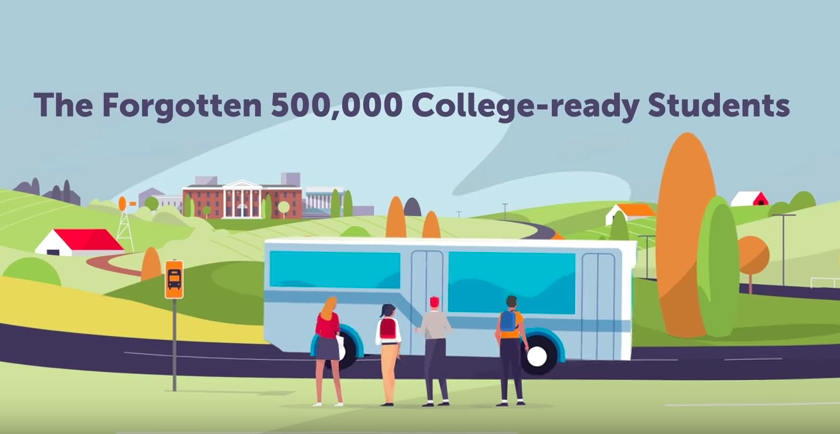
Every year, half a million top-scoring students never get a college credential
Every year, 500,000 students graduate in the top half of their high school class, yet never get a college credential—not even a certificate. To put this into perspective, that’s five million lost youth every decade. These students have the skills to graduate with a bachelor’s degree. They would even have a higher than 80 percent chance of graduating from the top 190 colleges. And yes, most of them go to college, but they drop out. What’s worse is that now they only have student-loan debt to show for their efforts.
The effects of this talent loss are immense for both the students and the US workforce. Each year, workers collectively miss out on $400 billion in wages they would be earning if they were college-educated. The US economy is going to be suffering too. By 2025, the supply of workers with a postsecondary credential will fall 11 million short of demand.
The impact of the failure isn’t confined to a specific race or social class either. The majority of the high-scoring students who don’t complete a credential are evenly distributed between the top half and bottom half of the income distribution. They come from all different races, as well. Sixty-nine percent of the students are White, 13 percent are Latino, eight percent are Black, and 10 percent are Asian and other.
Our research shows that students who obtain a BA make $1 million more than high school graduates over a lifetime. So, the question is, how can we help these qualified students earn a college credential? While there isn’t a one-size-fits-all answer, a good start would be investing in support services to help them graduate and career counseling to help them beyond graduation. Allocating just $5,000 more per student towards career and financial aid counseling would make a tremendous impact on a student’s chances of obtaining a college credential. We also should be clearly showing students what kind of labor force and earnings opportunities are available for those in particular college programs. Students with clear career pathways in mind have a much higher chance of graduating.
We can’t stand by idly as we continue to lose hundreds of thousands of qualified students every year. These students are ready and deserve our support to help them along the postsecondary pathway.
To learn more, watch our video or read our methodology.
Follow the Georgetown University Center on Education and the Workforce on Twitter, (@GeorgetownCEW), LinkedIn, and Facebook.
Dr. Carnevale is Director and Research Professor of the Georgetown University Center on Education and the Workforce, an independent, nonprofit research and policy institute affiliated with the Georgetown McCourt School of Public Policy that studies the link between education, career qualifications, and workforce demands.
Career Coach Volunteer Community Outreach Always ready for new challenges as a volunteer
5yI do not know what happens in Secondary schools in the US however in Calgary Alberta Canada there seems to be a belief that only universities matter. FYI in Canada there is a real distinction between University and College. Not only as a term but also what programs they offer and their relationship with the labour market. The cost of tuition is a deterrent for some although I suspect too many see student loans as debt vs. an investment tive thing
I help individuals (especially Veterans) develop the ability to make informed, self-directed career decisions, and to conduct effective employment searches ... chrishogg_linkedin(at)yahoo.com
5yAn interesting and thought-provoking article, on a significant topic. Still, the reader needs to see the background numbers, and be shown much more structural data and assumptions, before drawing conclusions or taking action. Deborah Burkholder asks, "Are we helping students understand the context and ramifications of choices along with the ability to pivot and reinvent as we learn to live in a volatile, uncertain, chaotic and ambiguous world?" It could very well be, in another 10 years, where most people attend "college" for perhaps 10 or 20 percent of their study time, and self-educate themselves for free via on-line courses the remasinder of the time. I'm finding, personally, that I can now find out the basics of just about anything by asking Mister Google and viewing YouTube (let alone availing of the several free education sites) ... and of course, if one is so inclined, simply reading books is still an option.
human resource and business leader | facilitator | connector | co-learning performance coach
5yThank you for doing this work and sharing this piece of your research, Anthony. The connection between formal education and career success going forward will be interesting to track. The world and opportunities for work are changing fast and the latest data in this study is six years old (Education Longitudinal Study (ELS), 2002-2012). Young people have seen educated parents not having the job security once promised by having a degree. We hear of "overnight successes" of dropouts. Are we helping students understand the context and ramifications of choices along with the ability to pivot and reinvent as we learn to live in a volatile, uncertain, chaotic and ambiguous world? I'd be interested in learning more about what the underlying reasons for dropping out. What lessons can we learn that may require us to rethink the role and structure of education in our lives?
Special Education Teacher at Capital Area School for the Arts Charter School
6yShould I be the one to point out that $5000 per student is 2.5 BILLION dollars. That’s a big number for investment. Also don’t discount those top performing students that leave the traditional path and help fill the skills gap in technical trades and make a fine living.
Catholic Deacon and Spiritual Director
6yThey may have good scores, but do they possess the skills to benefit from their knowledge?